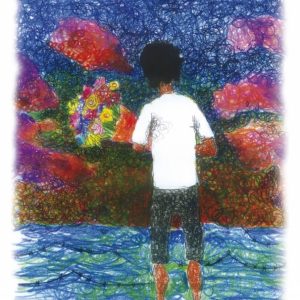
Story:
Putting flowers on a loved one’s grave is one way to say, “I love you. I miss you. I remember you.”
Francesco Piobbichi’s drawing gives us a brief glimpse into a young boy’s grief. The boy stands at the edge of the Mediterranean Sea, which has become a mass grave for over 35,000 refugees in the last decade. The statistic is staggering, yet this glimpse into one young boy’s grief has the power to move us in ways that statistics do not. It makes us wonder who he lost—who he misses—who he remembers. And it may even make us wonder, “What can I do to help?”
Francesco Piobbichi is a relief worker with Mediterranean Hope—and organization that seeks to save and welcome refugees trying to make their way across the Mediterranean. One of the ways Piobbichi has answered the question, “What can I do to help?” is by reminding us that each statistic has a story. He describes it this way: “My drawings tell a story that otherwise would be consigned to the oblivion of the sea” (Drawings from the Border, p. vi).
Bible Reading: Psalm 72:12-14 (NRSV)
Psalm 72 is a prayer. In fact, it may be a prayer written by King David for his son and successor, Solomon. Yet, the author of the prayer is not as remarkable as its values. Verses 12-14 cut straight to the heart what makes a good ruler. They may not be what we expect.
For he delivers the needy when they call, the poor and those who have no helper.
He has pity on the weak and the needy, and saves the lives of the needy.
From oppression and violence he redeems their life;
And precious is their blood in his sight.
Mahatma Ghandi once observed that, “A nation’s greatness is measured by how it treats its weakest members.” Psalm 72 seems to have a similar score card for political leaders.
In the caption for his drawing of the young boy with the flowers, Francesco Piobbichi suggests that we place a flower “for all the victims of this barbed sea made murderous by the selfishness of [human beings], from the hunger [for] profit that upsets the world…a flower for every innocent victim of this war of the rich against the poor” (Drawings from the Border, p. 55).
Discussion/Reflection:
- How would you grade your leaders against the rubric of Psalm 72? Why?
- Why is it so hard to respond to a statistic like the one cited in the story above? Was the 35,000 number a surprise to you?
- How do you respond to Piobbichi’s words about selfishness, profit, and “this war of the rich against the poor”?
Action:
- Learn more about Italian politicians’ response to the refugee crisis. Listen to the New York Times’ podcast, “The Daily,” from June 12, 2019: Italy First
- Listen to a news story about immigration in your context. Grade your political leaders against the rubric of Psalm 72:12-14.
Prayer: Help us to hold our leaders accountable, O God. Give us the courage to imagine the stories behind the statistics.
Welcoming the Stranger Series
In the last ten years more than 35,000 asylum seekers have died in the Mediterranean. Desperate to escape untenable situations in countries like, Syria, Eritrea, Sudan, and Somalia, refugees risk both life and livelihood to board rickety boats bound for what they hope will be a new life in Europe. Many of them die within sight of what they hoped would be the promised land.
Welcoming the Stranger is a devotional series designed to help Christians connect this unfolding humanitarian crisis in the Mediterranean with the Bible’s call to “welcome the stranger.” Recognizing that “the stranger” can sometimes be an abstraction that blinds us to the face of Christ, the series approaches the refugee crisis from a personal perspective. Each entry focuses on one person’s story, brought vividly to life by Italian artist and relief worker, Francesco Piobbichi. These stories are then linked to relevant Scripture, prayer, discussion, and action prompts.
Immigration is a hot topic around the globe, and the Bible passages in this series speak to wherever we are called to “welcome the stranger.” My specific interest in the Mediterranean context was sparked by a 2016 trip to the island of Lampedusa—a small island off the coast of Sicily that is the scene of so much hope and tragedy for refugees trying to enter Europe via small, unsafe boats. In addition learning about the situation there and the work being done by ecumenical groups like Mediterranean Hope, I spent significant time interviewing Francesco Piobbichi, whose art documents the stories of individual refugees and families who often die trying to reach safety. You can learn more about him and work through the following link: Francesco Piobbichi’s Artwork Each of his “snapshots” tells a story—sometimes of triumph, but often of tragedy: Piobbichi’s goal is to help people understand this large-scale human tragedy on a more personal level. My goal in this series is to use Piobbichi’s art as a starting point for Bible study and personal reflection/action.
